一、虚拟语气(9)
虚拟语气总结

虚拟语气总结虚拟语气是指在表达某种假设、愿望、建议、要求、命令等语境下,表示与事实相反或不确定的情况。
它在语法上通常通过动词的形式、时态或其他语法手段来反映。
在本文中,我们将对虚拟语气进行总结和探讨。
一、虚拟语气形式1. 虚拟语气的主要形式有三种:过去时的虚拟、与过去事实相反的情况下的虚拟和对现在或将来的非事实情况的虚拟。
2. 过去时的虚拟:过去时的虚拟主要用于表示对现在或将来情况的否定假设。
常见的情况包括:与现在相反的假设、对未来的假设、对现在或过去的怀疑等。
例如:“如果我有足够的时间,我会去旅行。
”这里的“我有足够的时间”是一个假设情况。
3. 与过去事实相反的情况下的虚拟:与过去事实相反的情况下的虚拟主要用于表示不可能实现的愿望、建议、要求等。
例如:“要是我会弹吉他,我就能在演唱会上表演了。
”这里的“要是我会弹吉他”是与过去事实相反的假设情况。
4. 对现在或将来的非事实情况的虚拟:对现在或将来的非事实情况的虚拟主要用于表示对现实情况的否定、愿望或命令等。
例如:“如果我是你,我会好好珍惜机会。
”这里的“如果我是你”表示的是一个对现实情况的否定假设。
二、虚拟语气的用法1. 表示假设:虚拟语气常用于表达假设情况。
例如:“要是明天下雨,我们就不去野餐了。
”这里的“要是明天下雨”是条件状语从句,使用的是与现在或将来相反的虚拟语气。
2. 表示愿望:虚拟语气也经常用于表达愿望。
例如:“但愿我能赢得比赛。
”这里的“但愿我能赢得比赛”表示的是希望,但并不一定会实现。
3. 表示建议和要求:虚拟语气还可以用于表示建议和要求。
例如:“我建议你好好休息,不要工作太晚。
”这里的“我建议你好好休息”是对对方的建议。
4. 表示命令和禁止:虚拟语气也可用于表示命令和禁止。
例如:“要求学生们不要在教室里吃东西。
”这里的“不要在教室里吃东西”是对学生们的命令。
三、虚拟语气的注意事项1. 虚拟语气在使用时需遵循一定的语法规则,例如在条件状语从句中,谓语动词需使用过去式的形式。
虚拟语气用法详解

河高高三英语语法专题讲练——虚拟语气用法一、条件句中的虚拟语气(1)现在时的条件句中的虚拟语气。
如:If he were free, he would help us.。
If he studied at this school, he would know you well.(2)过去时的条件句中的虚拟语气。
如:If I had seen the film, I would have told you about it.If I had got there earlier, I would have met Mr. Li. 假如(3)将来时的条件句中的虚拟语气。
如:If he should go to Qing Hua University, he would make full use of his time.If he were to come here, he would tell us about it.注意:1.当虚拟条件句的谓语动词含有were, should, had 时,if 可省略,而将were, should, had等词置于句首。
如:Should he agree to go there, we would send him there.Were she here, she would agree with us.Had he learnt about computers, we would have hired him to work here.2. 错综时间虚拟语气当条件状语从句表示的行为和主句表示的行为所发生的时间不一致时,被称为“错综时间条件句”,动词的形式要根据它所表示的时间作出相对应的调整。
If I were you, I would have gone to the theatre last night.If you had followed my advice just now, you would be better now.二、宾语从句中的虚拟语气1.表示请求、要求、命令或建议等意义的动词所接的宾语从句一般用虚拟语气,其虚拟语气的结构为:(should) + 原形动词。
虚拟语气句型 9 (虚拟语气在宾语从句中的应用) 例句

I suggested that we
should set off earlier.我坚持我们应该早点出发。
The chairman requested that
the members study the problem more carefully.
主席要求委员们应更认真地研究这个问题。
promise 允诺
propose提议 recommend
推荐 request(请求)require要求
suggest建议 urge主张
有时,上述动词+宾语从句不是表示主张、建议或要求等,而是表示其它的意义,这时则仍用陈述语气。如当insist表示对已发生过的事物的看法,或当suggest为“说明了”,“暗示”等含义时,从句用直陈语气而不用虚拟语气。
司令官命令我们连在拂晓前开始进攻。
I demanded that he (should)
tell me nothing but the truth.
我要求他不要废话,只讲实情。
The dean requested that the
visiting scholar (should) give lectures.
dismissed. 他们建议开除汤姆。
3. 在expect,believe, think,
suspect等动词的否定或疑问形式后的宾语从句经常用“should+动词原形或完成形式)”,表示惊奇,怀疑,不满等。
I never thought that he
should be such a brave young soldier.
(should) set up a special committee to look into the
英语复习虚拟语气

英语复习-虚拟语气一)在主语从句中1. 用于It is advisable/ odd/ desirable/ imperative/ natural/ necessary/ strange/ unusual, etc. + that 引导的主语从句中。
It is highly desirable that a new president (should) be appointed for the college.2. 用于It is desired, it is suggested, etc. +that 引导的主语从句中。
It is urged that he(should) be trained.It is requested thatMr.Wang(should)give a performance at the party.虚拟语气用在It is + 形容词(或过去分词)+ that... .的主语从句中,表示要求,建议,提议,命令,请求等,英国英语中从句的谓语用“should +原形动词(或完成式)构成”,而美国英语中则要求用原形动词。
该句型中常用的形容词或过去分词有:advisable, desirable, essential, important, better, keen, natural, necessary, probable, possible, strange, vital, desired, demanded, requested, suggested, recommended, required 等。
例如:It is necessary that the machine (should) be oiled once a week.It is important that everyone (should) obey the law.It is suggested that you take a walk after supper.在这些形容词前加highly也是可以的单独用好像不多见(二)虚拟语气用于下列动词后的宾语从句中advise arrange move(提议)beg demand deservedesire determine recommend ask insist orderprefer propose requitewish urge suggestsuppose decideI asked that I (should) be allowed to read whatever I liked.She move/ suggested that the meeting (should) be continued after lunch. 如果宾语从句中的动词是否定的,从句后应是not + 动词原形。
语气—虚拟语气

Unit 9 语气—虚拟语气
虚拟语气 其他从句
(3) 表语从句 / 同位语从句 e.g. The demand is that everyone keep a diary in English. e.g. The suggestion that he be invited to the party was accepted. 该类名词有advice(忠告), command命令), order, demand, desire(要求), request(要求), requirement(要 求), idea(意见), insistence(主张), motion(提议), proposal(提议), suggestion, plan, recommendation(劝 告), preference(偏爱)等。
Unit 9 语气—虚拟语气
祈使语气
注意:由于受汉语说话习惯的影响,常易出现如下错误:
e.g. Please you tighten your safety belt.(×)
e.g. Please tighten your safety belt.(√)
2) let’s 和 let us let’s: 讲话对象包括听话人和讲话人双方,表提出建 议,常译为 “咱们...” let us: 讲话对象只是听话人,常译为 “让我们...”.
Unit 9 语气—虚拟语气
非真实条件句 e.g. If it were not for the leadership of the party, we could not be living a happy life today. e.g. If it had not been for your help, we would not have achieved so much in our work. (4) 连词if的省略 在正式文体中,有时可把虚拟条件句中的连词if省略,而将 were, had, should等动词(不包括行为动词)提到主语前面。 e.g. Had the doctor been available, the child would have been saved. e.g. Were I to go to the moon some day, I should see the surface of the moon with my own eyes. e.g. Should it rain tomorrow, we would stay at home.
英语虚拟语气的基本用法归纳(优秀9篇)
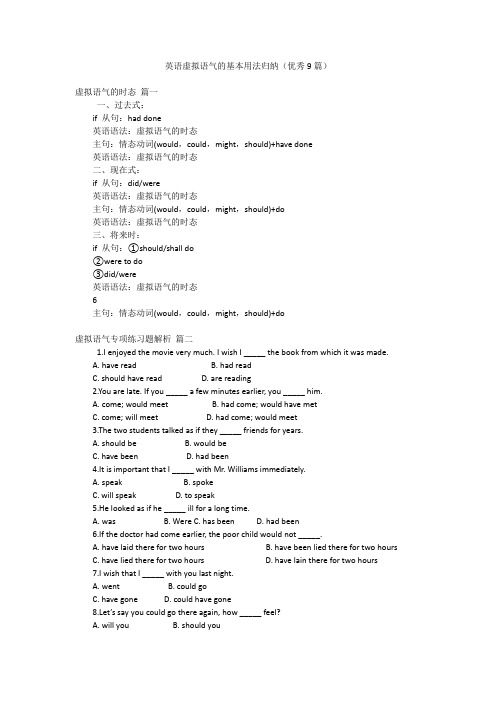
英语虚拟语气的基本用法归纳(优秀9篇)虚拟语气的时态篇一一、过去式:if 从句:had done英语语法:虚拟语气的时态主句:情态动词(would,could,might,should)+have done英语语法:虚拟语气的时态二、现在式:if 从句:did/were英语语法:虚拟语气的时态主句:情态动词(would,could,might,should)+do英语语法:虚拟语气的时态三、将来时:if 从句:①should/shall do②were to do③did/were英语语法:虚拟语气的时态6主句:情态动词(would,could,might,should)+do虚拟语气专项练习题解析篇二1.I enjoyed the movie very much. I wish I _____ the book from which it was made.A. have readB. had readC. should have readD. are reading2.You are late. If you _____ a few minutes earlier, you _____ him.A. come; would meetB. had come; would have metC. come; will meetD. had come; would meet3.The two students talked as if they _____ friends for years.A. should beB. would beC. have beenD. had been4.It is important that I _____ with Mr. Williams immediately.A. speakB. spokeC. will speakD. to speak5.He looked as if he _____ ill for a long time.A. wasB. WereC. has beenD. had been6.If the doctor had come earlier, the poor child would not _____.A. have laid there for two hoursB. have been lied there for two hoursC. have lied there for two hoursD. have lain there for two hours7.I wish that I _____ with you last night.A. wentB. could goC. have goneD. could have gone8.Let’s say you could go there again, how _____ feel?A. will youB. should youC. would youD. do you9.I can’t stand him. He always talks as though he _____ everything.A. knewB. knowsC. has knownD. had known10._____ the fog, we should have reached our school.A. Because ofB. In spite ofC. In case ofD. But for11.If you had told me in advance, I _____ him at the airport.A. would meetB. would had metC. would have metD. would have meet12.Mike can take his car apart and put it back together again. I certainly wish he_____ me how.A. teachesB. will teachC. has taughtD. would teach13.I would have told him the answer, had it been possible, but I _____ so busy then.A. had beenB. wereC. wasD. would be14.He’s working hard for fear that he _____.A. should fall behindB. fell behindC. may fall behindD. would fallen behind15.If it _____ another ten minutes, the game would have been called off.A. had rainedB. would have rainedC. have seenD. rained16.He suggested that they _____ use a trick instead of fighting.A. shouldB. wouldC. doD. had17.My father did not go to New York; the doctor suggested that he _____ there.A. not wentB. won’t goC. not goD. not to go18.I would have gone to the meeting if I _____ time.A. had hadB. have hadC. hadD. would have had19.Would you rather I _____ buying a new bike?A. decided againstB. will decide againstC. have decidedD. shall decide against20.You look so tired tonight. It is time you _____.A. go to sleepB. went to sleepC. go to bedD. went to bed21、—Why didn’t you buy a new car?—I would have bought one if I _____ enough money.A. hadB. have hadC. would haveD. had had22.If she could sew, _____.A. she make a dressB. she would have made a shirtC. she will make a shirtD. she would had made a coat23._____ today, he would get there by Friday.A. Would he leaveB. Was he leavingC. Were he to leaveD. If he leaves24.His doctor suggested that he _____ a short trip abroad.A. will takeB. would takeC. takeD. took25.The Bakers arrived last night. If they’d only let us know earlier,_____ at the station.A. we’d meet themB. we’ll meet themC. we’d have met themD. we’ve met them26.If I _____ you, I _____ more attention to English idioms and phrases.A. was; shall payB. am; will payC. would be; would payD. were; would pay27.We might have failed if you _____ us a helping hand.A. have not givenB. would not giveC. had not givenD. did not give28.The law requires that everyone _____ his car checked at least once a year.A. hasB. hadC. haveD. will have29.It is strange that he _____ so.A. would sayB. would speakC. should sayD. will speak30.Had I known her name, _____A. or does she know mine?B. and where does she live?C. she would be beautiful.D. I would have invited her to lunch.31.He has just arrived, but he talks as if he _____ all about that.A. knowB. knowsC. knownD. knew32.If I _____ the money, I would have bought a much bigger car.A. possessedB. ownedC. hadD. had had33.He was very busy yesterday; otherwise, he _____ to the meeting.A. would comeB. cameC. would have comeD. will come34.The librarian insists that John _____ no more books from the library before he returns all the books he has borrowed.A. will takeB. tookC. takeD. takes35.I left very early last night, but I wish I _____ so early.A. didn’t leaveB. hadn’t leftC. haven’t leftD. couldn’t leave36.I do not have a job. I would find one but I _____ no time.A. hadB. didn’t haveC. had hadD. have37.I wish that you _____ such a bad headache because I’m sure that you would have enjoyed the concert.A. hadn’tB. didn’t have hadC. hadn’t hadD. hadn’t have38.He insisted that we all _____ in his office at one o’clock.A. beB. to beC. would beD. shall be39.Helen couldn’t go to France after all. That’s too bad. I’m sure she would have enjoyed it if _____.A. she’s goneB. she’ll goC. she’d goneD. she’d go答案:1—5 BBDAD 6—10 DDCAD11—15 CDCAA 16—20 ACAAD21—25 DBCCC 26—30 DCCCD31—35 DDCCB 36—39 DCAC解析:1.wish后面用虚拟语气,表示与过去事实相反用过去完成时。
人教版九年级英语语法教学——虚拟语气

如果我有空,我就去那儿。
What would you
do if you won the
lottery? If I won the lottery, I would…
If I won the lottery, I would buy
an expensive car.
If I had a lot of money I would buy a villa.
____________ (get up) too late should get up tomorrow?
c. If Robots _____________ (control) were to control the world some day, here would be ________ (be) no friendship.
demand, request, desire
5. without和but for 构成虚拟。
Without 如果没有,要不是 but for要不是
1.如果没有阳光,人们的生活将会不同。 Without sunlight, people‟s life would be different. 2.要不是你的帮助,我不可能完成工作。 But for your help, I wouldn‟t have finished the work.
虚拟语气
If I were you,I would not leave
her alone.
Our teacher suggested that we go to the library this afternoon.
(The Subjunctive Mood)
表示说话人所说的话不是事实,而是一中假 设, 愿望, 怀疑或推测. 虚拟语气主要用于if条件状语从句,也可用 于名词性从句等.
虚拟语气用法详解

虚拟语气语气(mood)也是动词的一种形式变化。
这和中文中的语气是不一样的。
它表示说话者对所指的动词或状态所持的态度,而且,在谓语动词上有所体现,而中文没有体现。
语气可分为三种:陈述语气、祈使语气和虚拟语气。
虚拟语气(the Subjunctive Mood)表示说的话不是事实,或者是不可能发生的情况,而是一种愿望、建议或与事实相反的假设等。
一、虚拟条件句1.主句和从句都与现在事实相反时,从句用一般过去时,be的形式要用were,主句用would/could/ should/might+不定式一般式。
If I were you, I should not go with him.2.主句和从句都与过去事实相反时,从句用过去完成时,主句用would/should/could/might+不定式完成式。
If I had tried hard last term, I would have succeeded.3.当主句和从句都与将来事实相反,或指不大可能发生的事的时候,从句和与现在事实相反的从句时态相同,或用should/were to+不定式一般式,主句和与现在事实相反的主句相同。
If it rained/were to rain/should rain tomorrow, the match would be put off.4.在使用虚拟条件句时,由于语言环境的千差万别,各种时间关系混合使用是很常见的。
如果逻辑上讲得通,主句和从句的动词时态可进行各种各样的搭配。
If it hadn't rained those days, (从句与过去事实相反)1 work would be finished next week. (主句与将来事实相反)2.here wouldn't be any water in the river now. (主句与现在事实相反)一、语气及其种类1.语气(mood)语气是一种动词形式,表示讲话人对某一行为或事情的看法和态度。
虚拟语气完全归纳
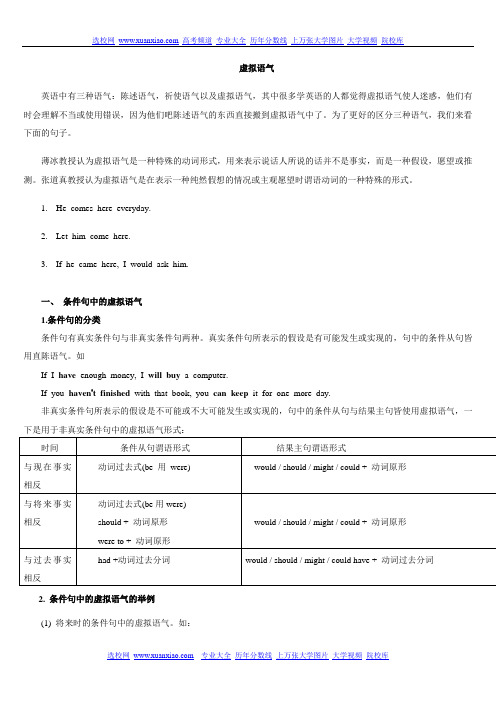
虚拟语气英语中有三种语气:陈述语气,祈使语气以及虚拟语气,其中很多学英语的人都觉得虚拟语气使人迷惑,他们有时会理解不当或使用错误,因为他们吧陈述语气的东西直接搬到虚拟语气中了。
为了更好的区分三种语气,我们来看下面的句子。
薄冰教授认为虚拟语气是一种特殊的动词形式,用来表示说话人所说的话并不是事实,而是一种假设,愿望或推测。
张道真教授认为虚拟语气是在表示一种纯然假想的情况或主观愿望时谓语动词的一种特殊的形式。
1.He comes here everyday.2.Let him come here.3.If he came here, I would ask him.一、条件句中的虚拟语气1.条件句的分类条件句有真实条件句与非真实条件句两种。
真实条件句所表示的假设是有可能发生或实现的,句中的条件从句皆用直陈语气。
如If I have enough money, I will buy a computer.If you haven’t finished with that book, you can keep it for one more day.非真实条件句所表示的假设是不可能或不大可能发生或实现的,句中的条件从句与结果主句皆使用虚拟语气,一下是用于非真实条件句中的虚拟语气形式:2. 条件句中的虚拟语气的举例(1) 将来时的条件句中的虚拟语气。
如:If he should go to Qing Hua University, he would make full use of his time. 如果他要上清华大学的话,他就会充分利用他的时间了。
If he were to come here, he would tell us about it. 如果他要来的话,他会通知我们一声。
(2) 现在时的条件句中的虚拟语气。
如:If he were free, he would help us. 要是他有空的话,它会帮助我们的。
虚拟语气
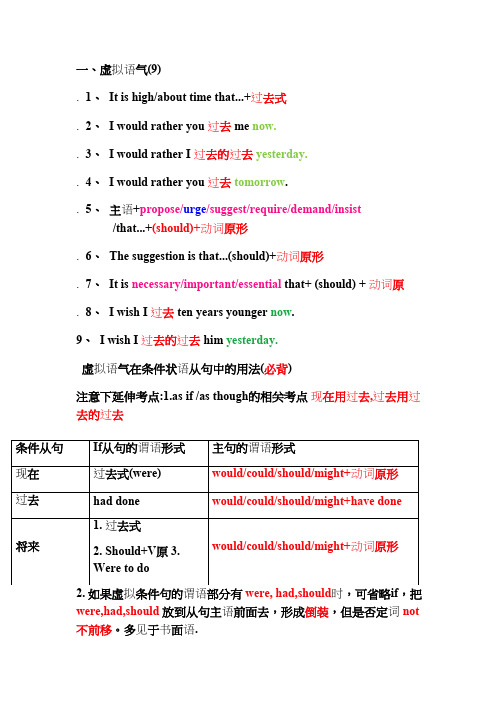
一、虚拟语气(9).1、 It is high/about time that...+过去式 .2、 I would rather you 过去me now. .3、 I would rather I 过去的过去yesterday. .4、 I would rather you 过去tomorrow. .5、主语+propose/urge/suggest/require/demand/insist /that...+(should)+动词原形 .6、 The suggestion is that...(should)+动词原形 .7、 It is necessary/important/essential that+ (should) + 动词原 .8、 I wish I 过去ten years younger now. 9、 I wish I 过去的过去him yesterday. 虚拟语气在条件状语从句中的用法(必背)注意下延伸考点:1.as if /as though的相关考点现在用过去,过去用过去的过去 were,had,should 放到从句主语前面去,形成倒装,但是否定词not 不前移。
多见于书面语.二、时态(4)1.You’d better + do sth... / You’d better not do sth...2,by the time / end of主句+将来完成时by the end of next year 主句+过去将来完成时by the end of 1999 (关键句:By the middle of the 21st century, the vast majority of the world’s people 将来完成时in cities rather than in rural areas..3、 It is/has been +一段时间+since 自从......已有...... .4、 for, since, so far, till, until一般与完成时连用(完成时提示词) 三、固定句式(12) 1、 I have no doubt + that2、 I have trouble/difficulty + (in) doing sth3、 It is/was.... + that (强调句)4、 The more..., the more The more..., the less 5. make it( clear, one’s duty, possible),it不可以省略。
高中英语语法-虚拟语气全总结

高中英语语法-虚拟语气全总结虚拟语气用于表示与现实相反的假设。
在非真实条件句中,如果从句表示与现在事实相反的假设,主句应该使用XXX动词原形。
例如,如果我有时间,我会参加会议。
如果你是我,你会抓住出国的机会。
如果从句表示与过去事实相反的假设,主句应该使用主语+XXX过去分词。
例如,如果你听从了我的建议,你就不会在考试中失败了。
如果从句表示与将来事实相反的假设,主句应该使用主语+XXX动词原形。
例如,如果你明天来,我们就会开会。
如果明天下雨,我们就会推迟运动会。
如果他明天不来,我们就会推迟会议到下周一。
有时候,条件状语从句和主句所表示的时间不一致,这时候被称为错综时间条件句。
动词的形式要根据它所表示的时间作出相应的调整。
例如,如果你刚才听从了我的建议,你现在会更好。
如果你之前努力研究,你现在就是一名大学生了。
在条件句中,可以省略if,把were、had、should提到句首,变成倒装句式。
例如,如果我还有上学的机会,我会更加努力研究。
→Were I at school again。
I would study harder.Had you arrived earlier。
you would have caught the bus.If it rains tomorrow。
we won't be able to go climbing.What would you do if you had a n dollars?Without your help。
we XXX the work ahead of time.I was ill that day。
otherwise I XXX.He called me to inform me about your birthday。
or else I wouldn't have known about it.A man who s drinking water would be dead in about seven days.I might have been able to offer you more assistance。
九年级英语复习 虚拟语气 反义疑问句
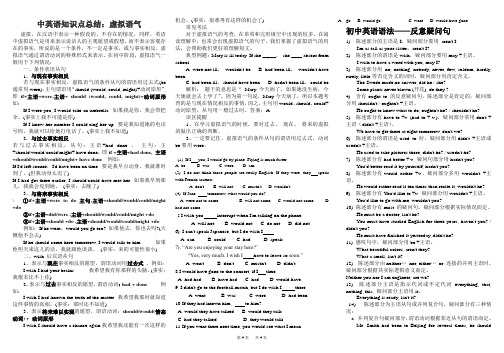
中英语知识点总结:虚拟语气虚拟,在汉语中表示一种假设的,不存在的情况,同样,英语中虚拟语气是用来表示说话人的主观愿望或假想,而不表示客观存在的事实,所说的是一个条件,不一定是事实,或与事实相反。
虚拟语气通过谓语动词的特殊形式来表示。
在初中阶段,虚拟语气一般用于下列情况:一、条件状语从句1、与现在事实相反若与现在事实相反,虚拟语气的条件从句的谓语用过去式(be 通常用were),主句谓语用“should (would, could, might)+动词原形”,即if+主语+were,主语+ should (would, could, might)+动词原形如:If I were you, I would take an umbrella. 如果我是你,我会带把伞。
(事实上我不可能是你)If I knew her number I could ring her up. 要是我知道她的电话号码,我就可以给她打电话了。
(事实上我不知道)2、与过去事实相反若与过去事实相反,从句:主语+had done ,主句:主+should/would/could/might+ have done,即if +主语+had done, 主语+should/would/could/might+ have done例如:If I'd left sooner,I'd have been on time. 要是我早点动身,我就准时到了。
(但我动身太迟了)If I had got there earlier, I should/could have met her. 如果我早到那儿,我就会见到她。
(事实:去晚了)3、与将来事实相反\ ①if+主语+were to do 主句,主语+should/would/could/might +do②if+主语+did/were ,主语+should/would/could/might +do③if+主语+should +do ,主语+should/would/could/might +do例如:If he went,would you go too? 如果他去,你也去吗?(大概他不会去)If he should come here tomorrow, I would talk to him. 如果他明天来这儿的话,我就跟他谈谈。
(完整版)虚拟语气讲解
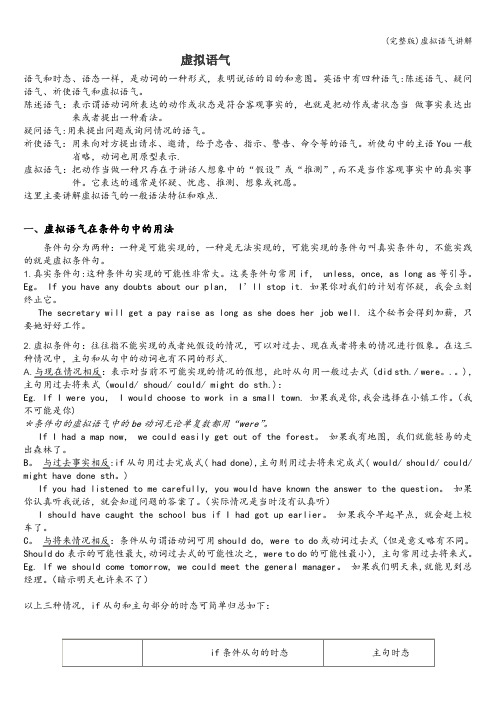
虚拟语气语气和时态、语态一样,是动词的一种形式,表明说话的目的和意图。
英语中有四种语气:陈述语气、疑问语气、祈使语气和虚拟语气。
陈述语气:表示谓语动词所表达的动作或状态是符合客观事实的,也就是把动作或者状态当做事实表达出来或者提出一种看法。
疑问语气:用来提出问题或询问情况的语气。
祈使语气:用来向对方提出请求、邀请,给予忠告、指示、警告、命令等的语气。
祈使句中的主语You一般省略,动词也用原型表示.虚拟语气:把动作当做一种只存在于讲话人想象中的“假设”或“推测”,而不是当作客观事实中的真实事件。
它表达的通常是怀疑、忧虑、推测、想象或祝愿。
这里主要讲解虚拟语气的一般语法特征和难点.一、虚拟语气在条件句中的用法条件句分为两种:一种是可能实现的,一种是无法实现的,可能实现的条件句叫真实条件句,不能实践的就是虚拟条件句。
1. 真实条件句:这种条件句实现的可能性非常大。
这类条件句常用if, unless, once, as long as等引导。
Eg。
If you have any doubts about our plan, I’ll stop it. 如果你对我们的计划有怀疑,我会立刻终止它。
The secretary will get a pay raise as long as she does her job well. 这个秘书会得到加薪,只要她好好工作。
2. 虚拟条件句:往往指不能实现的或者纯假设的情况,可以对过去、现在或者将来的情况进行假象。
在这三种情况中,主句和从句中的动词也有不同的形式.A. 与现在情况相反:表示对当前不可能实现的情况的假想,此时从句用一般过去式(did sth./ were。
.。
),主句用过去将来式(would/ shoud/ could/ might do sth.):Eg. If I were you, I would choose to work in a small town. 如果我是你,我会选择在小镇工作。
高三讲义9
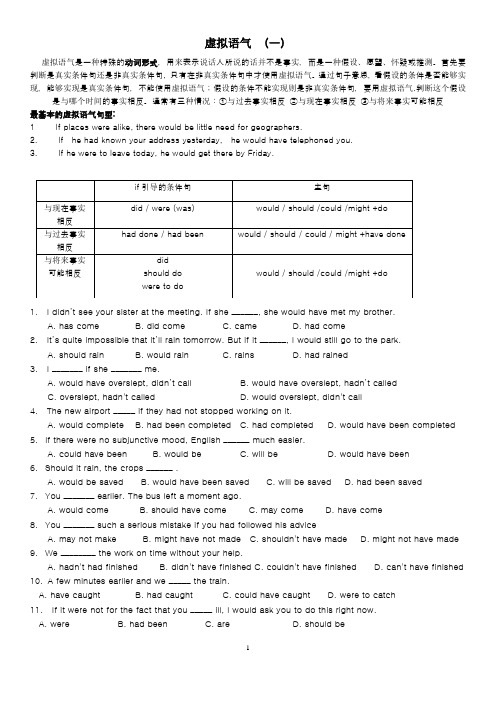
虚拟语气(一)虚拟语气是一种特殊的动词形式,用来表示说话人所说的话并不是事实,而是一种假设、愿望、怀疑或推测。
首先要判断是真实条件句还是非真实条件句, 只有在非真实条件句中才使用虚拟语气。
通过句子意思,看假设的条件是否能够实现,能够实现是真实条件句,不能使用虚拟语气;假设的条件不能实现则是非真实条件句,要用虚拟语气.判断这个假设是与哪个时间的事实相反。
通常有三种情况:①与过去事实相反②与现在事实相反③与将来事实可能相反最基本的虚拟语气句型:1 If places were alike, there would be little need for geographers.2. If he had known your address yesterday, he would have telephoned you.3. If he were to leave today, he would get there by Friday.1. I didn’t see your sister at the meeting. If she ______, she would have met my brother.A. has comeB. did comeC. cameD. had come2. It’s quite impossible that it’ll rain tomorrow. But if it ______, I would still go to the park.A. should rainB. would rainC. rainsD. had rained3. I _______ if she _______ me.A. would have oversl ept, didn’t callB. would have overslept, hadn’t calledC. overslept, hadn't calledD. would overslept, didn't call4. The new airport _____ if they had not stopped working on it.A. would completeB. had been completedC. had completedD. would have been completed5.If there were no subjunctive mood, English ______ much easier.A. could have beenB. would beC. will beD. would have been6.Should it rain, the crops ______ .A. would be savedB. would have been savedC. will be savedD. had been saved7.You _______ earlier. The bus left a moment ago.A. would comeB. should have comeC. may comeD. have come8.You _______ such a serious mistake if you had followed his adviceA. may not makeB. might have not madeC. shouldn't have madeD. might not have made9.We ________ the work on time without your help.A. hadn't had finishedB. didn't have finishedC. couldn't have finishedD. can't have finished10. A few minutes earlier and we _____ the train.A. have caughtB. had caughtC. could have caughtD. were to catch11. If it were not for the fact that you _____ ill, I would ask you to do this right now.A. wereB. had beenC. areD. should be12. If it _______ so hard, we'd go to town.A. isn't rainingB. doesn'tC. weren't rainingD. isn't going to rain13. —If he ______, he _______ that food. —Luckily he was sent to the hospital immediately.A. was warned; would not takeB. had been warned; would not have takenC. had been warned; had not takenD. would have been warned; had not taken14. ---If I had a lot of money, I_____ around the world. ---Stop dreaming! Just do what you should do!A. were to travelB. would travelC. could have traveledD. will travel15. This printer is of good quality. If it ___ break down within the first year, we would repair it at our ex pense.A. wouldB. shouldC. couldD. might虚拟语气(二)I. 错综时间虚拟语气若主句从句所指的时间不一致,即条件从句表示与过去事实相反,主句表示与现在事实相反;或者条件从句表示与现在事实相反,主句表真实情况,则从句中应采用与具体时间相对应的虚拟形式。
初中虚拟语气讲解及专项练习与答案(带解析)
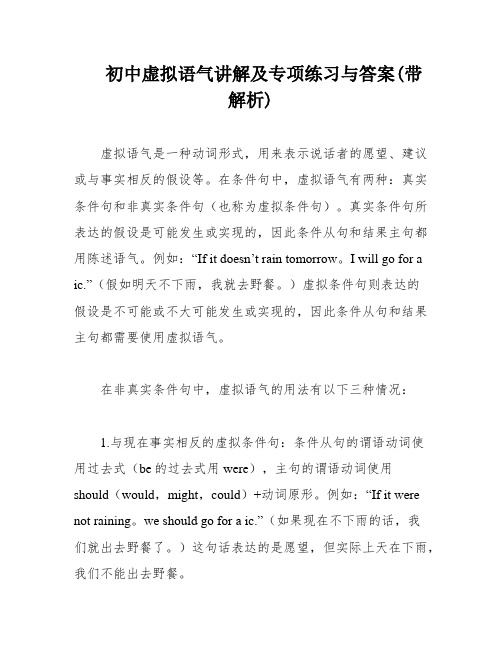
初中虚拟语气讲解及专项练习与答案(带解析)虚拟语气是一种动词形式,用来表示说话者的愿望、建议或与事实相反的假设等。
在条件句中,虚拟语气有两种:真实条件句和非真实条件句(也称为虚拟条件句)。
真实条件句所表达的假设是可能发生或实现的,因此条件从句和结果主句都用陈述语气。
例如:“If it doesn’t rain tomorrow。
I will go for a ic.”(假如明天不下雨,我就去野餐。
)虚拟条件句则表达的假设是不可能或不大可能发生或实现的,因此条件从句和结果主句都需要使用虚拟语气。
在非真实条件句中,虚拟语气的用法有以下三种情况:1.与现在事实相反的虚拟条件句:条件从句的谓语动词使用过去式(be的过去式用were),主句的谓语动词使用should(would,might,could)+动词原形。
例如:“If it were not raining。
we should go for a ic.”(如果现在不下雨的话,我们就出去野餐了。
)这句话表达的是愿望,但实际上天在下雨,我们不能出去野餐。
2.与过去事实相反的虚拟条件句:条件从句的谓语动词使用had+过去分词,主句的谓语动词使用should(would,might,could)+have+过去分词。
例如:“If he had come here。
he might have been able to help you.”(如果他来过这里,他或许能够帮助你。
)这句话表达的是对过去事实的假设,但实际上他没有来这里,他也没有帮助你。
3.与将来事实可能相反的虚拟条件句:条件从句的谓语动词可以使用动词过去式(be的过去式用were)、should+动词原形或were to+动词原形,主句的谓语动词使用should (would,might,could)+动词原形。
例如:“If it should rain tomorrow。
XXX.”(如果明天下雨的话,我们就取消野餐计划。
(9)虚拟语气

b
y
,
y w
o u
e o u n
.
ld
o e e
9
0
d ir
()
e e
t
r o
h
o n
o u se
.
Th
t
a
o u
o u
ld
t
d
t
9
0
to
he
e , e n
ta ti
S
u s a n
:
Y w
s
b
t
u
t t
e t五 r a
b
n
,
u s
ke
o u
s
s u e
h m
u
a o r e
,
l
o n
g
r o
n
t
t
a n
k
n r
o r e
h
a
n
f
t
o u
fi ke ?
r s
Su Pe
s a
n
一
Bu
t
t
e
o
下 1 t n
lo
,
g w
.
o u
ld
he bo
,
r a
i
n
t
a
If i t
、,
a
s
o n
it n
,
e a n
t
e r
:
If i
o
t
n
r
w l
a
a s a
1
a n e a s s
s u
p
高三英语(外研版)总复习语法课件:专项语法突破(9)情态动词与虚拟语气

必修5
专项语法突破(九)
高考英语总复习
情态动词 +完成式 would rather have done
用法 表示“当时宁愿做了某
例句
外 研 版
事”; 其否定式表达相反 I would rather have 含义。两者都表示“后 taken her advice. 悔”之意。
必修5
专项语法突破(九)
外 研 版
might
必修5
专项语法突破(九)
高考英语总复习
(2)表示具体事情实际发生的可能性时,may,must 常 用于肯定句中,一般不用于否定句和疑问句中(may not 表 示“可能不”);can 常用于否定句、疑问句或感叹句中, 表示疑惑、 惊讶或不相信等意思; could 既可用于肯定句中, 又可用于否定句、疑问句中。如:
高考英语总复习
外 研 版
必修5
Module 4~Module 6
高考英语总复习
专项语法突破(九)
情态动词与虚拟语气
外 研 版
必修5
专考情态动词和虚拟语气考点统计表
外 研 版
必修5
专项语法突破(九)
高考英语总复习
二、热点透析 1. 情态动词和虚拟语气是近几年高考中的重点考查项 目。 2.情态动词的考查热点依次是: (1)表示推测和可能性; (2)表示必要性; (3)情态动词的其他常考点。
外 研 版
必修5
专项语法突破(九)
高考英语总复习
Accidents can happen on such rainy days. 这样的多雨天气可能会发生事故。(客观的可能性) Peter may come with us tonight,but he isn’t sure yet. 彼得今晚可能来我们这儿,但他还没确定。(实际可能 性,不用 can)
9虚拟语气语法讲义+英语的语气与虚拟语气知识点总结-2022届高考英语语法复习
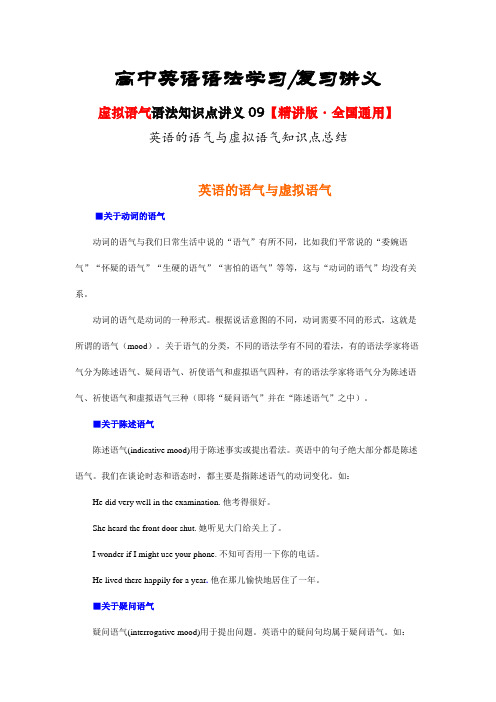
高中英语语法学习/复习讲义虚拟语气语法知识点讲义09【精讲版·全国通用】英语的语气与虚拟语气知识点总结英语的语气与虚拟语气■关于动词的语气动词的语气与我们日常生活中说的“语气”有所不同,比如我们平常说的“委婉语气”“怀疑的语气”“生硬的语气”“害怕的语气”等等,这与“动词的语气”均没有关系。
动词的语气是动词的一种形式。
根据说话意图的不同,动词需要不同的形式,这就是所谓的语气(mood)。
关于语气的分类,不同的语法学有不同的看法,有的语法学家将语气分为陈述语气、疑问语气、祈使语气和虚拟语气四种,有的语法学家将语气分为陈述语气、祈使语气和虚拟语气三种(即将“疑问语气”并在“陈述语气”之中)。
■关于陈述语气陈述语气(indicative mood)用于陈述事实或提出看法。
英语中的句子绝大部分都是陈述语气。
我们在谈论时态和语态时,都主要是指陈述语气的动词变化。
如:He did very well in the examination. 他考得很好。
She heard the front door shut. 她听见大门给关上了。
I wonder if I might use your phone. 不知可否用一下你的电话。
He lived there happily for a year. 他在那儿愉快地居住了一年。
■关于疑问语气疑问语气(interrogative mood)用于提出问题。
英语中的疑问句均属于疑问语气。
如:Where do you come from? 你是哪里人?Why are you so nervous? 你为什么这样紧张?What did you do that for? 你做这个干什么?How many windows are broken? 打破了多少扇窗户?Why don’t you think more about other people?你怎么就不多为别人着想呢?■关于祈使语气祈使语气(imperative mood)用于提出命令、要求、请求、邀请、劝告或建议等。
高考英语语法复习九:虚拟语气

语法复习九:动词的语气——虚拟语气一、语气的定义和种类l、语气:语气是动词的一种形式,它表示说话人对某一行为或事情的看法和态度。
2、语气的种类:(1)陈述语气: 表示动作或状态是现实的、确定的或符合事实的,用于陈述句、疑问句和某些感叹句。
如:We are not ready. 我们没准备好。
What a fine day it is!多好的天气啊!(2)祈使语气: 表示说话人的建议、请求、邀请、命令等。
如: Open the door, please。
请打开门。
(3)虚拟语气: 表示动作或状态不是客观存在的事实,而是说话人的主观愿望、假设或推测等。
如: If I were you, I should study English. 如果我是你,我就学英语了。
May you succeed! 祝您成功!二、虚拟语气在条件从句中的用法条件句有两类,一类是真实条件句,一类是虚拟条件句。
如果假设的情况是有可能发生的,就是真实条件何。
在这种真实条件句中的谓语用陈述语气。
如: If it doesn’t rain tomorrow, we will go to the park. 如果明天不下雨,我们就去公园。
如果假设的情况是过去或现在都不存在的,或将来不大可能发生的,则是虚拟条件句。
如: If he had seen you yesterday, he would have asked you about it. 如果他昨天见到你,他会问你这件事的。
(事实上他昨天没见到你,因此也未能问你这件事。
)在含有虚拟条件句的复合句中,主句和从句的谓语都要用虚拟语气。
现将虚拟条件从句注: 主句中的should只用于I、we,但在美国英语中,should常被would代替;从句中的should 可用于各种人称。
l、表示与现在事实相反的假设和结果。
如: If my brother were here, everything would be all right. 要是我哥哥在这儿,一切都没问题了。
- 1、下载文档前请自行甄别文档内容的完整性,平台不提供额外的编辑、内容补充、找答案等附加服务。
- 2、"仅部分预览"的文档,不可在线预览部分如存在完整性等问题,可反馈申请退款(可完整预览的文档不适用该条件!)。
- 3、如文档侵犯您的权益,请联系客服反馈,我们会尽快为您处理(人工客服工作时间:9:00-18:30)。
一、虚拟语气(9).1、 It is high/about time that...+过去式 .2、 I would rather you 过去me now. .3、 I would rather I 过去的过去yesterday. .4、 I would rather you 过去tomorrow. .5、主语+propose/urge/suggest/require/demand/insist /that...+(should)+动词原形 .6、 The suggestion is that...(should)+动词原形 .7、 It is necessary/important/essential that+ (should) + 动词原 .8、 I wish I 过去ten years younger now. 9、 I wish I 过去的过去him yesterday. 虚拟语气在条件状语从句中的用法(必背)注意下延伸考点:1.as if /as though的相关考点现在用过去,过去用过去的过去 2. 如果虚拟条件句的谓语部分有were, had,should时,可省略if,把were,had,should 放到从句主语前面去,形成倒装,但是否定词not 不前移。
多见于书面语.二、时态(4)1.You’d better + do sth... / You’d better not do sth...2,by the time / end of主句+将来完成时by the end of next year 主句+过去将来完成时by the end of 1999 (关键句:By the middle of the 21st century, the vast majority of the world’s people 将来完成时in cities rather than in rural areas..3、 It is/has been +一段时间+since 自从......已有...... .4、 for, since, so far, till, until一般与完成时连用(完成时提示词) 三、固定句式(12) 1、I have no doubt + that2、I have trouble/difficulty + (in) doing sth3、It is/was.... + that (强调句)4、The more..., the more The more..., the less 5. make it( clear, one’s duty, possible),it不可以省略。
6、It is difficult ( adj. ) + to do sthIt is + adj. + for sb to do sth7、It is likely + to do sthIt is unlikely + to do sthIt is likely + that It is unlikely + that8、It/there is no use/no good/no point + doing9、Only to +动词(......,结果却......)10、动名词在“There is ( was ) no + doing ”结构中作主语例如:There is no denying that she is very efficient.11.It is/was not until...that(直到...才) 12.It was not+时间段+before(没过多长时间就...)It was+一段时间+before从句(过了多长时间之后才到...)四、倍数/从句(6)twice as much/many as(区分可数与不可数).1、主语+谓语+倍数(或分数)+ as + adj. + as Eg: I have three times as many as you.我有你三倍那么多。
.2、 (表语从句)应使用The reason...is that ...或This / it / that / is because ...等句型。
(只记这一个考点) 不要使用The reason...is because that...句型 .3、 (同位语从句)fact ( idea, news, belief, thought, doubt, order, suggestion, proof, message, conclusion, desire, theory, truth,information ,word) that...最常考得五个同位语单词。
.4、 (定语从句)that和which在指物的情况下一般都可以呼唤,但在下列情况下,一般用that而不用which。
1、先行词为 all,everything,nothing,something,anything,little,much等不定代词 时; 2、先行词被all,every,no,some,any,little,much 等修饰时;3、先行词序数词或最高级修饰时。
(the first ,the beat)理解; 4、先行词被the only,the very,the same 修饰时。
Which 使用的两种情况;(1)非限定性定语从句(2)介宾搭配,如with which, of which等5、(主语从句)that和what缺少主语或宾语用what,不缺少用that All that= all=what=all what6、(状语从句) the moment /the minute/the instant 一......就......(只记这一个考点)、、让步n/adj+as/though+主+谓(固定公式) 六、主谓一致(4) 1、就近原则either...or; neither...nor ; not only...but also, there be2、就远原则:besides, but, except, with, as well as, like, together with3、The number of+单数/A number of+复数 4、The singer and write+单数(表示一个人) 七、反意疑问句(2).1、 There be句型,疑问部分也要用there .2、由think, believe, expect, suppose, imagine等引导的宾语从句,主语是第一人称(I/We)的时候,疑问部分与 宾语从句相对应构成翻译疑问句。
前否后肯,前肯后否。
八、倒装(4).1、倒装中的否定词或者半否定词 这类词或短语主要有never, neither, nor, little, seldom,rarely, hardly,scarcely,no sooner,not only, in no way,at no time, few, not, no等 .2、NB代表not only...,but also...引导的并列句。
not only位于句首时,所引导的前面的分句倒装,后面的分句不倒装。
故此称为“前倒后不倒”。
.3、O代表only+状语从句;NU代表not until+状语从句。
此两种结构位于句首时,倒装主句而不倒装从句。
即:主倒从不倒。
拓展考点:完全倒装的四个考点:There+be结构,用来替代be动词的有exist,seem,happen,appear,live,rise,stand等在以here, there, now, then等副词开头的句子里, 如果主语是人称代词,就不用倒装。
表示方向的副词out,in,up,down等置于句首,要用全部倒装。
如果主语是人称代词就不用倒装. 当表示地点的介词词组(如on the wall,under the tree,in front of thehouse等)在句首时. 4. So + 助动词+主语:也一样So + 主语+ 助动词:的确如此九、形容词与副词(3)1形容词与副词的排序问题: those three beautiful large old red Chinese wood.2.某些以-ior结尾的形容词进行比较时,用to 代替than。
这些词有inferior(劣等的,次的)、superior(较好的,优于......)、junior(资历较浅的)、senior(资格较老的)、prior(在......之前)等。
3.在形容词、副词的比较级钱,可用much,a little, still, even, far, a bit,a lot等来修饰。
十、非谓语动词(9)有辅助课件,一起看!1、let, have, make, get等表使役的动词Let/ have/ make sb do ; get sb to dohave(11年—24T) (1)、have sb do sth 让某人做某事 (2)、have sth/sb doing 让某事处于持续不停的状态之中。
5(3)、have sth done 让别人做此事.2、 see、watch、notice、hear、listen to、observe、feel等表感官动词的不定式均不带to 。
.3、不定式做结果状语的固定搭配 too+ adj/adv to do so+ adj/adv as to do/that从句 such+ n as to do/从句adj/adv+enough to do .4、“使......怎么样”之类的动词 amusement,astonish,excite,frighten, interest, move, relax, satisfy, shock, surprise,encourage, disappoint, puzzle, tire, please, inspire, terrify,worry, 它们的ing形式表示主动,而过去分词表示被动,一般情况下“人”用ed ,“物”用ing 。
.5、介词but except除......之外的,前面有行为动词do时,不定式不带to ,否则带 to .6、why not do sth(为何不做某事) 固定搭配 “越......越好;无论......也/都不过分”:Cannot/ hardly / never / scarcely too...to... Youcannot be too careful to cross the street. 你过街时越小心越好。
